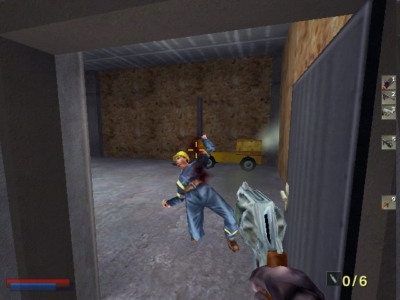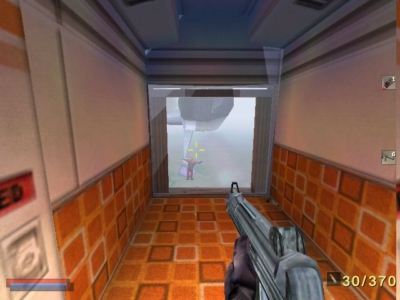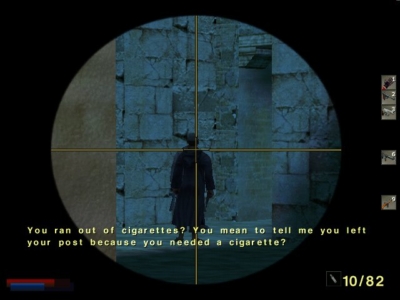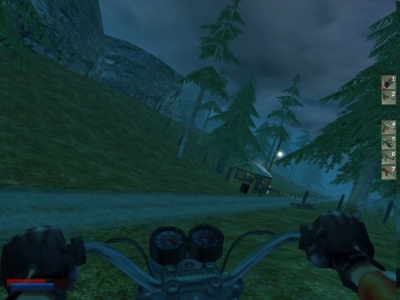
The Operative: No One Lives Forever
Written by: Rik
Date posted: May 26, 2008
- Genre: Action
- Developed by: Monolith
- Published by: Fox Interactive
- Year released: 2000
- Our score: 6
The thought occurred to me recently that there aren’t nearly as many spy-based games out there as there could be. While it may seem like a ridiculous claim, exhaustive research (well, a brief moment’s thought followed by ten minutes flicking around on Mobygames) later revealed it to be a reasonable hypothesis, considering the overwhelming number of James Bond and similarly-themed films churned out by Hollywood over the years, along with the not-unrealistic assumption that a combination of sneaking around, car chases and all-action gunfights (backed up, preferably, by some decently-written narrative) could make for a fairly palatable gaming experience. Though many titles contain at least some of the elements described above, few have sought to recreate the feeling of a Bond or a Bourne, choosing to focus primarily on one element of gameplay, be it stealth, action, or car chases, rather than attempting to offer a more rounded package.
The Operative: No One Lives Forever (hereafter known as NOLF) makes a reasonable effort to do so, however, offering pretty much all of the gadgets, vehicles, guns and villainous nemeses you’d expect from a decent spy caper. Strictly speaking, though, it’s more Austin Powers than Bond, with its 60s setting offering numerous opportunities for tongue-in-cheek humour along with the presence of the requisite ‘groovy’ (sigh) music and fashion of the era. A further twist is that the game’s protagonist is female, with you taking control of cat-burglar-turned-novice-spy Cate Archer, and experiencing first-hand the numerous prejudices she faces as she tries to forge a career in a all-male world during less enlightened times. Political!

Enemies tend to ham-up their own demise once you dispatch them. It’s mildly amusing, but does mean you tend to waste a few bullets.
Let the record state that my own tongue was firmly in my cheek there, as there’s clearly no such agenda in NOLF, with the presence of Archer as the heroine serving only as a reminder, as if it were needed, that not every computer game character has to be an unshaven gruffly-voiced muscleman. And all joking aside, the setting does actually provide for quite an interesting opening to the game. As Archer, you’re thrown in at the deep end following the death and/or disappearance of a number of your male counterparts, fighting off barbs about her ability from her superiors, and generally participating in missions that are deemed failures. In game terms you didn’t really fail – NOLF isn’t one of those games that lets you progress even if you’re crap, and it’s merely pushing you down its mostly-linear story arc – but it’s a refreshing change from having a game build you up as the world’s biggest hardass, only to have the tutorial and/or early levels congratulate you with sincere enthusiasm for accomplishing the simplest of tasks.
There are no such platitudes here, though, and early missions are tough, varied and action-packed. Your very first task, for example, is to protect a dimwitted American diplomat from a near-constant threat of assassination in Morocco by taking down his would be killers with a sniper rifle before they can get a shot away. That’s right – you actually get to start the game with some half-decent weapons – and though it’s by no means an impossible task, lapses in concentration can result in ‘game over’. As soon as this part of the mission completed, bad guys immediately storm your hotel room, forcing a frenetic firefight which continues as you make your escape. Frankly, it’s great, and it’s exactly the kind of set-piece you’d want and expect from a game of this sort.
There are plenty of other decent missions to follow, too, and you’ll find that being forced out of an aeroplane without a parachute, investigating a sunken boat, escaping enemy forces on a motorbike, and battling helicopter machine guns while sitting prone on a cable car are among the highlights as you progress through the game. In-between, there’s a significant amount of more conventional first-person action, although here things are made more interesting by the presence of Bond-style gadgets, including lipstick bombs, dead body removal powder, infra-red sunglasses and a fake female dog that can be used to distract hungry Alsatians on patrol (no, really).
It all sounds so good, I’ve almost just convinced myself I had more fun with this game than I actually did. Unfortunately, the genuinely exciting moments in NOLF are counterbalanced by some extremely dull sections which see you plodding aimlessly around unexciting environments in search of something or other while occasionally being called upon to shoot some generic baddies in the face. The game uses a few devices to attempt to set it apart from your standard FPS during these sections, but, sadly, they aren’t particularly effective at doing so. For starters, the various gadgets at your disposal, while fun, aren’t required all that often, and when they are, the mission in question is normally preceded by a training section telling you how a particular item should be used, sending you a clear signal that you’ll come across a similar situation ‘in the field’ very, very, soon.
Should you choose to ignore such clear signposting, however, there’s usually another way around the problem anyway, effectively rendering the gadgets a largely pointless indulgence. At the start of each mission the number of items you can carry in your inventory are limited, so you have to choose which gadgets (and guns) you think will serve you best in your mission. While the developer’s intentions here were probably to offer multiple solutions to a particular situation a lá Deus Ex, in truth it doesn’t often make that much difference whether you pick a lock with your hairpin or shoot it off with your silenced pistol. And if you’re going to encounter a situation which absolutely requires you to use a particular item in order to successfully complete the mission, the game locks it into your inventory so you don’t even have the option not to take it.
You’re also required to use stealth at different points during the game, which is not something I normally greet with any enthusiasm seeing as I’m rubbish at sneaking around in games (it’s my nerves, you see) but I guess it’s fair enough, what with NOLF being a spy game and all that. Generally, though, it does help to know what the rules are in terms of when you can be seen, what happens when you’re discovered and so on. Here, things don’t seem desperately consistent, with guards sometimes noticing that you’ve just sniped their nearby colleague, and sometimes going merrily about their business without a care in the world. Security cameras can be quick to spot you peeking around, but seem to have quite a short range, and triggering the alarm can sometimes bring an insurmountable number of guards to your location, but at other times you’re allowed to proceed fairly easily with the sirens wailing in your ears for the duration of the mission. As a result, you can’t help but conclude this element of the game hasn’t been implemented all that well.
One final novelty that’s worth mentioning is the fact that you can quite often eavesdrop on the conversations of faceless henchmen as they go about their business (before you sneak past them or blow them away, of course). Such discussions are where the bulk of the game’s satirical content is to be found, with spy clichés cheerfully discussed and derided while you crouch patiently behind a wall. While there are a couple of snigger-worthy lines, listening to much of this dialogue is a chore, but unfortunately it’s also pretty crucial to your progress in the game, as gun-related interruptions on your part usually mean you have a tougher battle on your hands. Burst in all guns blazing and you’ll normally have to take on both men, but wait for the conversation to take its course and you might only have to get rid of one of them, or avoid combat altogether. Sometimes you might even find out some useful plot or mission-related information, too, although it’s rarely anything earth-shatteringly crucial, and general impression is that of a game attempting to bribe you into listening to their ‘hilarious’ script.
Essentially what this sustained pissing and moaning boils down to is the fact that although NOLFattempts to add something to the generic FPS staples of shooting people and opening doors, the combination of additional features it offers aren’t enough to compensate for the relatively high number of yawnsome levels you’re forced to endure throughout the course of the game. There are some good bits, granted, but unfortunately the ratio of good/rubbish is around 40:60, which isn’t really enough to warrant hearty recommendation in my book.

That’s torn it. Watching the back end of your plane fall away in preparation for a parachute-less jump.
That’s essentially what I had to say about this game, although a combination of poor planning and sloppy writing means that I’ve rambled on for far too long without mentioning lots of things that I should technically have included. In keeping with the general style of this review, I’ll shoehorn them in at the end instead. So, in no particular order, here goes: the graphics are pretty ugly, even by the standards of the time – the environments and characters are boxy and uninteresting, and the colour palette seems washed-out; the plot and dialogue are (as ever) a mixed bag, but in general the story and cut-scenes aren’t something to keep you playing – see I’ll noot kill a felloo Scort (tagging on some extra words and passing it off as a side feature – brilliant! – a reader); the music is annoying, but eventually crawls into your head until you convince yourself it’s pretty good (for some reason while humming the main theme I had an inescapable urge to mentally segue in a clip of Shirley Bassey singing “NOOO-ONE LIVES FOEUREVEEEEER!!!” to the tune of, well, you know); and finally, I had scribbled a note to myself saying “AI routines nicked from Die Hard: Nakatomi Plaza” – which is of course utter bollocks, because this game was released first – but if you’ve played that game (or even read the review) you’ll know what I mean.
Phew. In conclusion, then, The Operative: No-One Lives Forever has plenty of plus points, with a relatively ambitious blueprint, a variety of decent (and occasionally thrilling) set-pieces, a strong central character, as well as offering a few novel spy-based features in an attempt to make it stand out from the crowd. Although it drags in places (and with a greater regularity than a good shooter should), the moment you find yourself considering packing it in for good and going out for a brisk walk, there’s usually a good bit that comes along just in time to keep you interested for a little bit longer. Still, I personally found it a fairly unremarkable experience. While you could certainly do a lot worse, in a packed genre that’s not exactly a ringing endorsement.




 Posts
Posts